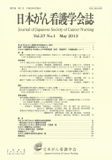Japanese
English
- 販売していません
- Abstract 文献概要
- 参考文献 Reference
要旨
本研究の目的は,緩和ケア病棟で行われている呼吸困難マネジメントの実践状況と,呼吸困難マネジメントと看護師の知識・技術・態度の関連を明らかにすることである.東海・北陸地域にある緩和ケア病棟に勤務する看護師276名に対し,看護師背景・呼吸困難に関する基礎知識・技術・態度・ケアの実施状況について質問紙調査を行った.回収率は89.1%であった.呼吸困難マネジメントの基礎知識の結果は,呼吸困難の性質,モルヒネの効果は9割以上と高く,医療用麻薬の追加が呼吸抑制に与える影響は5割程度と低かった.呼吸困難マネジメントにおけるアセスメントスケールの知識がある者は,実施している呼吸困難に対するケアが多いことから,スケールの知識をもとにアセスメントを行い,意図的に援助につなげていると推測された.呼吸困難に対するケアは,体位の工夫や不安の軽減は9割以上と高く,スクィージングは6割が理解し,4割が実施していた.重回帰分析の結果,身体的ケア実施には基礎知識,身体的ケア技術,呼吸困難に対する態度が影響していたことから,理解が不十分である知識や技術の教育が身体的ケアの実施を促進することが示唆された.精神的ケア実施には精神的ケア技術,呼吸困難に対する態度,コミュニケーションに対する態度が影響しており,呼吸困難に対する態度を養うことに加えて,コミュニケーションスキルを身につける必要があると示唆された.
Abstract
The purpose of this study was to clarify the relationship between dyspnea management in palliative care units and nurses' knowledge, skills, and attitudes. A questionnaire survey was conducted with 276 nurses working in palliative care units in the Tokai and Hokuriku regions of Japan. The questionnaire included items on nurses' backgrounds and their basic knowledge, skills, attitudes, and implementation of care in dyspnea management. The response rate to the questionnaire was 89.1 %. Basic knowledge of dyspnea was high on questions related to the nature of dyspnea and the effects of morphine, with a correct response rate of more than 90 %, but low with regard to the effect of additional medical narcotics on dyspnea, with a correct response rate of around 50 %. It is conjectured that nurses with knowledge of assessment scales in dyspnea management conduct assessments based on that knowledge, and that this may be linked to better patient care. The correct response rate for questions on dyspnea care related to adjusting body position and relieving anxiety was high at more than 90 %. Sixty percent of respondents understood the squeezing technique and 40 % could perform it. The results of multiple regression analysis suggest that training for knowledge and skills where understanding is insufficient promoted the practice of physical care, since basic knowledge, physical care skills, and attitude toward dyspnea affects the implementation of physical care. The implementation of psychological- emotional care is affected by psychological-emotional care skills, attitude toward dyspnea, and attitude toward communication, suggesting that in addition to cultivating a proper attitude toward dyspnea, acquiring communication skills is necessary.
Copyright © 2013, Japanese Society of Cancer Nursing All rights reserved.


